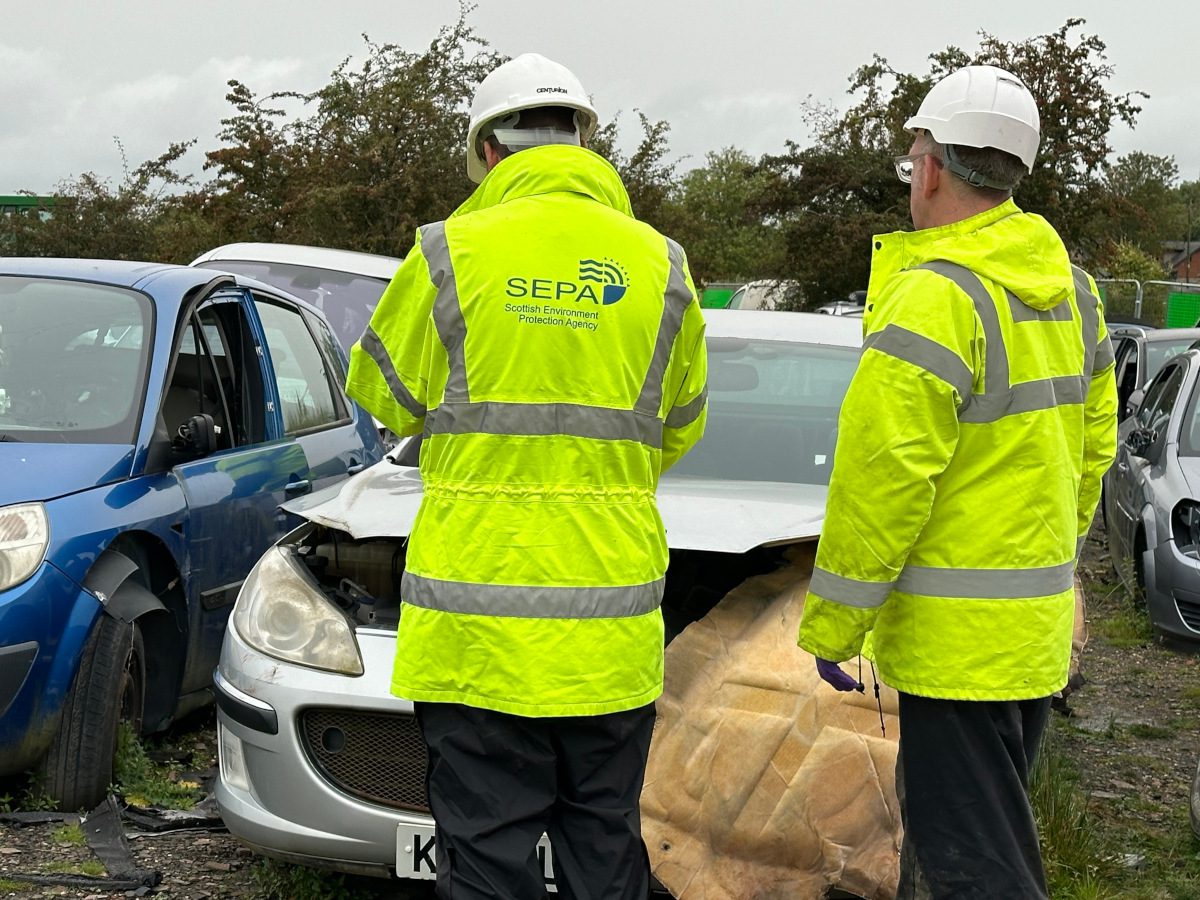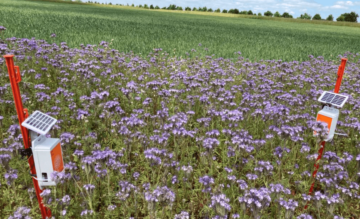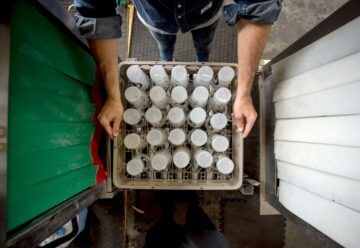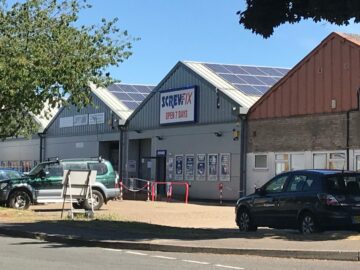

SEPA was appealing to the public for information (on 28 September) to help with an investigation into potential illegal activity in North Lanarkshire in late September, at a location linked to waste vehicles.
Officers from SEPA, North Lanarkshire Council and Police Scotland were gathering information on the range of businesses operating in the area, the size and scale of operations, the number of vehicles present and the risk of harm to the environment.
The location in question, which SEPA said it was not identifying due to its ongoing investigation, has expanded significantly without the appropriate environmental and planning permissions, and there are concerns around waste criminality.
The regulator has a dedicated intelligence and enforcement function supporting geographic teams in investigating waste crime. Calum McGregor, Unit Manager in SEPA’s Environmental Crime Team, said: “We are warning criminals – your activities are firmly in the spotlight and compliance with Scotland’s environmental laws is non-negotiable. In Scotland, businesses committed to doing the right thing by our environment will find a regulator that supports innovation and excellence. For those who do the wrong thing you’ll find a regulator that won’t hesitate to act.
“We know that unauthorised end of life vehicle (ELV) sites can be linked to other criminality, which is why days of action such as this are so important to tackling waste criminality on a national level. Working with partners such as Police Scotland and local authorities – as well as Scotland’s Serious Organised Crime Task Force, the Joint Unit for Waste Crime, and cross border agencies – means that SEPA can make it harder for criminals to get a foot in legitimate waste businesses, and where these sites have appeared it will become easier to require those responsible to clean them up.
“I’d encourage anyone who thinks they may have information about waste crime in Scotland to get in touch with SEPA. Our officers cannot be everywhere, and the public are often our eyes and ears across the country. While this day of action was targeted at end-of-life vehicles, please do share any concerns you may have about waste crime of any type. Other suspicious activity can include approaches to bury waste on land, increases in lorries moving on and off sites (especially at night) as well as sudden increases in waste amounts, odours and flies.”
Appeal for information
Members of the public who believe they may have information about waste crime in the area, including individuals or companies buying scrap cars without providing the appropriate paperwork (such as a Certificate of Destruction), dumping of tyres or unusual activity at sites are encouraged to contact SEPA.
This can be done 24 hours a day, seven days a week, through SEPA’s Pollution Hotline, either online at sepa.org.uk/report or by calling 0800 80 70 60. Reports can be made anonymously – but people are encouraged to leave contact details so additional information can be gathered if required.
Criminality around end-of-life vehicles
Every year around two million new vehicles are registered in the UK and a similar number are scrapped. This means around two million tonnes of vehicle waste each year – along with large volumes of waste tyres.
End of life vehicles (ELVs) contain a range of potential contaminants such as engine oil, coolant, brake and steering fluids, oily vehicle parts such as engines, gearboxes and axles, and oil filters and batteries, which all pose a risk to the environment if they are not treated, recycled or disposed of properly. Sites that deal with ELVs must hold a Waste Management Licence or exemption from SEPA, which will contain a number of conditions or rules designed to ensure the environment is protected. Waste vehicles must be stored and treated without causing harm to the environment and specific requirements, such as impermeable surfaces with provision for spillage collection and appropriate storage containers for parts and fluids, must be met.
The agency estimates that there are currently over 100 unauthorised ELV sites across Scotland, ranging from small scale breaking of vehicles for reselling parts to industrial estates where multiple unlicensed ELV operations are taking place. Evidence suggests that many may be involved in wider criminality and a few may have links to serious and organised crime groups.
- SEO Powered Content & PR Distribution. Get Amplified Today.
- PlatoData.Network Vertical Generative Ai. Empower Yourself. Access Here.
- PlatoAiStream. Web3 Intelligence. Knowledge Amplified. Access Here.
- PlatoESG. Carbon, CleanTech, Energy, Environment, Solar, Waste Management. Access Here.
- PlatoHealth. Biotech and Clinical Trials Intelligence. Access Here.
- Source: https://envirotecmagazine.com/2023/10/04/sepa-appeals-for-information-to-tackle-waste-crime-in-north-lanarkshire/
- :has
- :is
- :not
- :where
- $UP
- 100
- 24
- 28
- 60
- 70
- 80
- a
- About
- across
- Act
- Action
- activities
- activity
- Additional
- Additional Information
- agencies
- agency
- All
- along
- amounts
- an
- and
- Anonymously
- any
- anyone
- appealing
- appeals
- appeared
- approaches
- appropriate
- ARE
- AREA
- around
- AS
- At
- Authorities
- banners
- batteries
- BE
- become
- believe
- border
- Breaking
- businesses
- but
- Buying
- by
- calling
- CAN
- cannot
- cars
- causing
- certificate
- collection
- committed
- Companies
- compliance
- Concerns
- conditions
- contact
- contact details
- contain
- Containers
- contaminants
- content
- Council
- country
- Crime
- Criminals
- Cross
- Currently
- day
- Days
- deal
- dedicated
- designed
- details
- disabled
- do
- doing
- done
- due
- each
- easier
- either
- encourage
- encouraged
- end
- enforcement
- Engine
- Engines
- ensure
- Environment
- environmental
- Envirotec
- especially
- estimates
- everywhere
- evidence
- Excellence
- expanded
- Eyes
- few
- filters
- Find
- firmly
- Foot
- For
- Force
- from
- function
- gathered
- gathering
- geographic
- get
- Group’s
- harder
- harm
- Have
- help
- hold
- HOURS
- HTTPS
- identifying
- if
- Illegal
- image
- important
- in
- include
- Including
- Increases
- individuals
- industrial
- information
- Innovation
- Intelligence
- into
- investigating
- investigation
- involved
- IT
- ITS
- joint
- Know
- Land
- large
- Late
- Laws
- Leave
- legitimate
- Level
- Licence
- Life
- linked
- links
- local
- location
- made
- make
- management
- manager
- many
- May..
- means
- met
- million
- moving
- multiple
- must
- National
- New
- night
- no
- None
- North
- number
- of
- off
- officers
- often
- Oil
- on
- ongoing
- online
- operating
- Operations
- or
- Other
- our
- over
- paperwork
- partners
- parts
- People
- permissions
- Place
- planning
- plato
- Plato Data Intelligence
- PlatoData
- please
- Police
- Pollution
- pose
- potential
- present
- properly
- protected
- providing
- provision
- public
- qualified
- question
- range
- ranging
- registered
- regulator
- Reports
- require
- required
- Requirements
- reselling
- responsible
- right
- Risk
- rules
- Said
- Scale
- Scotland
- Sepa
- September
- serious
- seven
- Share
- significantly
- similar
- Sites
- Size
- small
- So
- specific
- Spotlight
- steering
- storage
- stored
- such
- sudden
- Suggests
- Supporting
- Supports
- suspicious
- tackle
- tackling
- taking
- targeted
- Task
- task force
- team
- teams
- that
- The
- The Area
- the joint
- the UK
- Them
- There.
- These
- they
- thing
- Thinks
- this
- those
- Through
- to
- touch
- treated
- two
- type
- Uk
- unit
- unusual
- vehicle
- Vehicles
- volumes
- warning
- was
- Waste
- week
- WELL
- were
- which
- while
- WHO
- why
- wider
- will
- with
- without
- working
- Wrong
- year
- you
- Your
- zephyrnet










